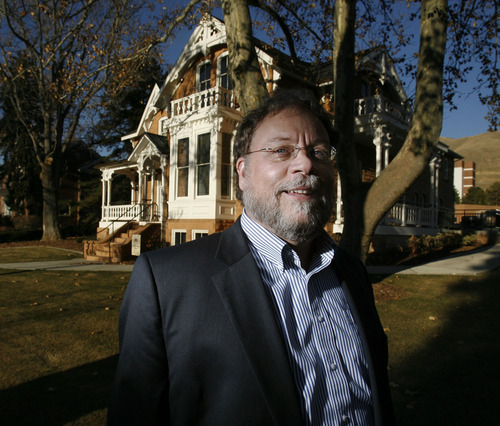This is an archived article that was published on sltrib.com in 2012, and information in the article may be outdated. It is provided only for personal research purposes and may not be reprinted.
The University of Utah is retooling its tech-commercialization machinery while extending a paid one-year leave of absence to the current system's architect, Jack Brittain.
Brittain stepped down July 1 as vice president of technology venture development while officials look to "take full advantage of university research and to better facilitate coordination of technology across campus," the university announced in a press release Friday afternoon.
Brittain's departure was disclosed in the last paragraph of the release, even though it is the most salient information. During his leave, he is expected to "help explore creation of a new institute to enhance the student side of academic entrepreneurship and technology commercialization."
Such an entity already exists in the form of the Lassonde Entrepreneur Center, but U. spokesman Keith Sterling said the idea is to spread the concept across the university. Brittain will continuing drawing his $424,000 paycheck, among the U.'s most lucrative administrative salaries.
"With a decade of service, he is entitled to maintain his current salary while on leave," Sterling wrote in an e-mail.
Vice president for research Tom Parks will oversee tech ventures on an interim basis, but a search for a permanent successor is not currently under way.
"I don't know if that has anything to do with fixing anything," Parks said. "This is an opportunity to review the new things that have been introduced and see if we can make them better. The energy and enthusiasm among students and faculty for commercialization activities has been high."
Meanwhile, the U. health-sciences wing plans to establish a new medical-device entrepreneurship unit under the leadership of John Langell, a professor of surgery. The proposed Center for Medical Innovation will operate as a collaboration among the College of Engineering, schools of Medicine and Business, and the Technology Commercialization Office, according to Langell.
"We've been top in the nation for tech startups coming from the university environment, and we've got a tried and tested pipeline for ideas to become reality," Langell said in a prepared statement."By breaking down cross-departmental and inter-generational barriers, the center will remove some of the few remaining obstacles to launching the University of Utah into the global forefront of medical innovation."
Friday's announcement gave no explanation for Brittain's departure from the high-level Cabinet post established by former U. President Michael Young. Brittain, a professor of management, came to the U. in 1999 as dean of the David Eccles School of Business. Young promoted him in 2005 to vice president of technology development, responsible for patenting faculty inventions and ushering them into the marketplace through licensing agreements and business support. Under Brittain's watch, the U. soon became the nation's most prolific university for starting up new companies based on technologies developed on campus through sponsored research, according to numerous U. press releases over the years.
However, some of these spinoffs were wholly owned by the U. with no life outside the university's tech-transfer office, raising concerns among many in the entrepreneur and campus communities. The office's former director Brian Cummings, who departed more than a year ago to Ohio State, is still listed as a top officer of many of these firms, which have little or no true management, payroll, address or funding. Other spinoffs had little connection to U. research.
But many others have landed federal small-business innovation grants and venture investment, put promising medical devices into the market, are run by talented entrepreneurs and provide jobs.



